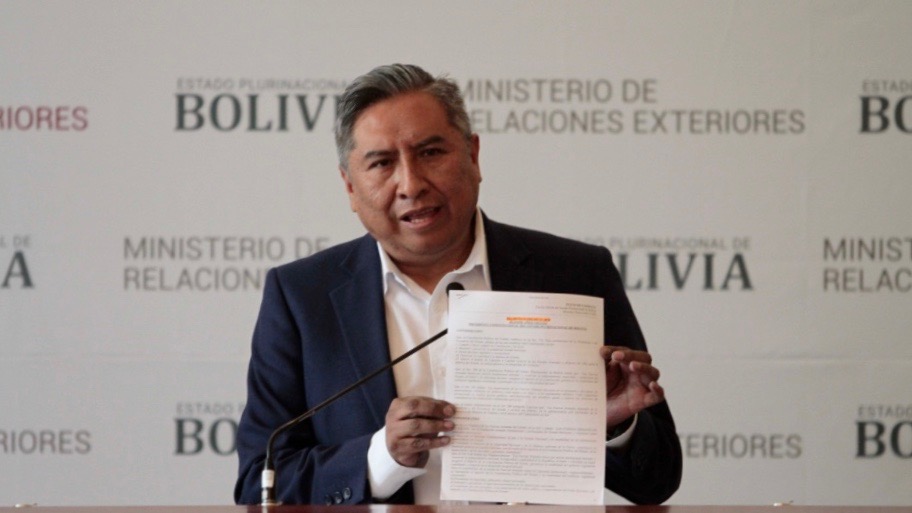The government of Bolivian President Luis Arce on Tuesday, June 28, rejected the recent statements made by Brazilian President Jair Bolsonaro wherein he claimed that former de facto Bolivian President Jeanine Áñez was innocent and offered her political asylum. The Bolivian government described Bolsonaro’s statements as “absolutely impudent” and “inappropriate interference in internal affairs.”
Bolivian Foreign Minister Rogelio Mayta held a press conference in capital La Paz to respond to the Brazilian President and clarified that Bolivia would never allow interference in the decisions that sovereignly relate to its justice system.
“We regret the unfortunate statements by the President of Brazil, Jair Bolsonaro, which are absolutely impertinent, constitute an inappropriate interference in internal affairs, do not respect the forms of relations between States, and do not coincide with the good neighbor relations and mutual respect between Brazil and Bolivia. Under no circumstances we will accept interference in decisions that sovereignly correspond to the Bolivian justice system and the constitutionality of the Plurinational State of Bolivia,” said Mayta.
Mayta, who is also a human rights lawyer, recalled that Áñez is being prosecuted by the Bolivian Justice for “various criminal charges, including having committed serious human rights violations according to the investigation carried out by the Interdisciplinary Group of Independent Experts sent by the Inter-American Commission on Human Rights (IACHR).”
He also reiterated that in the first days of Áñez’s rule, she passed a decree (4078) that exempted police and military officials participating in repression operations against protesters on the streets against the coup from criminal responsibility, which subsequently resulted in the massacre of 11 peaceful protesters in Sacaba city on November 15, 2019, and of 11 people in Senkata on November 19, 2019 by security officials, in addition to injuring hundreds of protesters.
Mayta stressed that the deaths and grave human rights violations that occurred in November 2019 “deserve justice” and “for that, the necessary processes must be developed.” He added that the Bolivian state has the “obligation” to carry out the necessary judicial processes to provide justice to the victims of that period, which has also been recommended by various international human rights organizations.
The Foreign Minister stated that “even thinking of a situation in which Áñez could evade justice is inadmissible. Impunity is inadmissible.” He also indicated that the government is working on a “diplomatic espousal” in response to Bolsonaro’s statements.
"La impunidad es inadmisible, ratificamos el compromiso de #Bolivia para lograr el respeto de los #DDHH que fueron transgredidos en esos lamentables días del 2019, tal cual han expresado las recomendaciones del #GIEIBolivia de la #CIDH", manifestó el canciller @RogelioMayta_Bo. pic.twitter.com/VArV7ZRKLb
— Cancillería de Bolivia (@MRE_Bolivia) June 28, 2022
What did Bolsonaro say?
In an interview with the online program “4 x 4” on Sunday, June 26, Bolsonaro announced that he would offer political asylum to Áñez, who was sentenced to 10 years in prison earlier this month for illegally assuming the presidency in November 2019 following a right-wing civic-military coup that overthrew democratically elected socialist President Evo Morales.
Bolsonaro described Áñez’s detention and the judicial conviction against her as “unfair”, and said that “Brazil is putting into practice the issue of international relations, human rights, to see if it can bring Jeanine Áñez and offer her asylum in Brazil. It is unfair to the woman imprisoned in Bolivia.”
Confirmation of Brazil’s involvement in 2019 coup
Various legislators of the ruling left-wing Movement Towards Socialism (MAS) party said that Bolsonaro’s offer confirmed his complicity in the 2019 coup d’état.
“We are gradually seeing how the whole plan of a coup is becoming much more visible. We were aware that this plan was not only an internal plan, but also an external one,” said Freddy Mamani, the president of the Chamber of Deputies.
Meanwhile, Senator Luis Adolfo Flores rejected Bolsonaro “openly interfering in decisions of independent bodies in Bolivia” and questioned his offer, stating that it went against international regulations for granting political asylum.
“According to the United Nations Refugee Agency (UNHCR), political asylum is only granted to an exiled person or who has fled their country for political reasons. Jeanine Áñez is not contemplated in any of those conditions,” said Flores.
Flores also pointed out that Bolsonaro’s recent confirmation that he had met Áñez in person and her denial of meeting him personally was another evidence of Brazil’s complicity in the coup.





